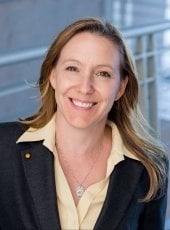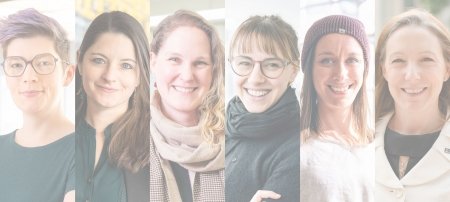Adrienne Minerick, dean of the College of Computing at Michigan Technological University, is president-elect of the American Society for Engineering Education (ASEE).
Engineering education was already changing — and now it has to. As the ASEE announcement for their now-virtual conference in June says, “Can we follow the stay-home orders and have a conference? Of course. We're engineers. We can solve anything.”
About the Researcher
Minerick says this can-do attitude is integral to the engineering profession and its education mission. She looks forward to navigating changes and leveraging opportunities for innovation at a national scale. As a member of the Michigan Tech community, both as dean of the University’s newest college and as a chemical engineering faculty member, Minerick has held ground for new ways to think about microfluidic medical devices and career advancement for women, people of color and minority groups, as well as shifts in education like the industry-driven realignment that created the College of Computing.
“ASEE is the place where engineering and engineering technology educators plan for the futures our students will encounter,” Minerick said. “I am able, willing and ready to help seed conversations that enable engineering professionals to leverage the rapid growth in computing and cybertechnologies to ensure our students engineer a bright future.”
Diversity in engineering education is key, she added. “Study after study, many by ASEE authors, has shown that increasing diversity of teams decreases engineering failures. We are in an exciting time when traditional engineering and educational practices are being re-examined from additional — and different — perspectives.”
Minerick’s platform focused on simplifying ASEE processes to shift the governance mindset to encourage engineering access and mobility of ideas. Collaboration is the ticket to innovation. Minerick plans to build off the board’s long-range planning to minimize barriers to pilot creative new strategies, measure those strategies’ impact, and empower engineering teams to catapult forward ethically and socially informed engineering solutions that efficiently solve our present and ongoing global grand challenges in a manner that can be sustained. ASEE can help students and faculty rise to the challenges.
Sheryl Sorby, ASEE’s next president and professor in the Engineering Education Innovation Center at Ohio State University, is no stranger to working with Minerick. Sorby formerly taught in Michigan Tech’s Engineering Fundamentals program.
“I am thrilled that Adrienne will be following me as president-elect and then president of ASEE. Two women from Michigan Tech for two years in a leadership role at ASEE is fantastic,” Sorby said. “Adrienne shows steady, solid leadership and is insightful and visionary. She is someone who gets things done! I'm looking forward to the next two years of working with her and others on the board. As president, it will be nice to know that there will be someone I can depend on as president-elect.”
Alongside Sorby, the ASEE Board of Directors, and other organization leaders, Minerick will serve as president-elect from June 2020 to June 2021, a year that will surely be shaped by COVID-19 response efforts and their impacts on education, engineering industries and student lives. She will serve as president from June 2021 to June 2022, and as past-president the following year.
“ASEE will be in good hands with Adrienne at the helm,” said Stephanie Adams, ASEE’s current president and dean and Lars Magnus Ericsson Chair at the University of Texas-Dallas. “I have known her for a number years and find her to possess a deep and detailed understanding of the engineering and higher education enterprises. She will bring a thoughtful, inclusive and decisive approach to her presidency and I look forward to her leadership and working with her next year from the past-president position.”
Michigan Technological University is an R1 public research university founded in 1885 in Houghton, and is home to nearly 7,500 students from more than 60 countries around the world. Consistently ranked among the best universities in the country for return on investment, Michigan's flagship technological university offers more than 120 undergraduate and graduate degree programs in science and technology, engineering, computing, forestry, business, health professions, humanities, mathematics, social sciences, and the arts. The rural campus is situated just miles from Lake Superior in Michigan's Upper Peninsula, offering year-round opportunities for outdoor adventure.







Comments